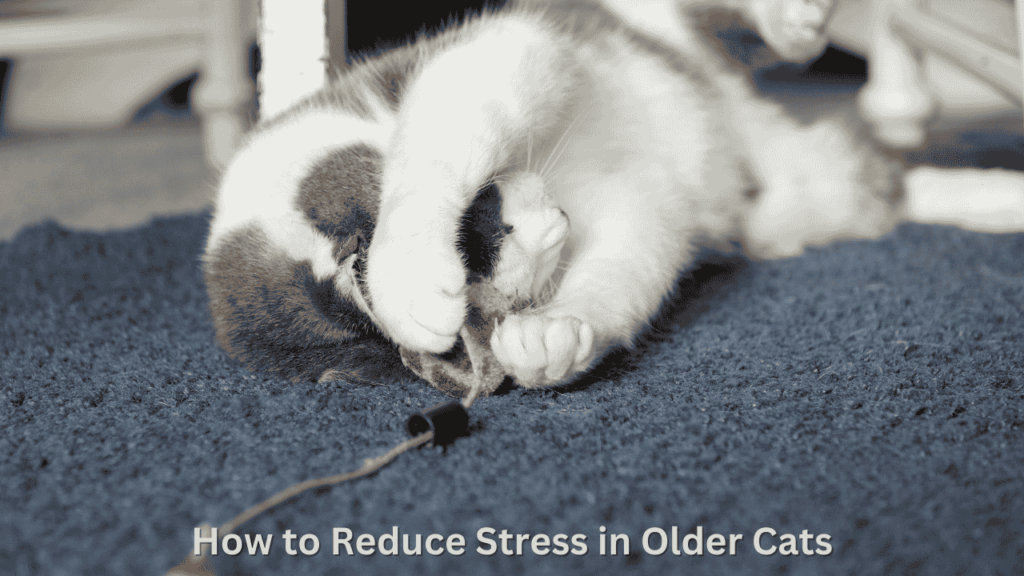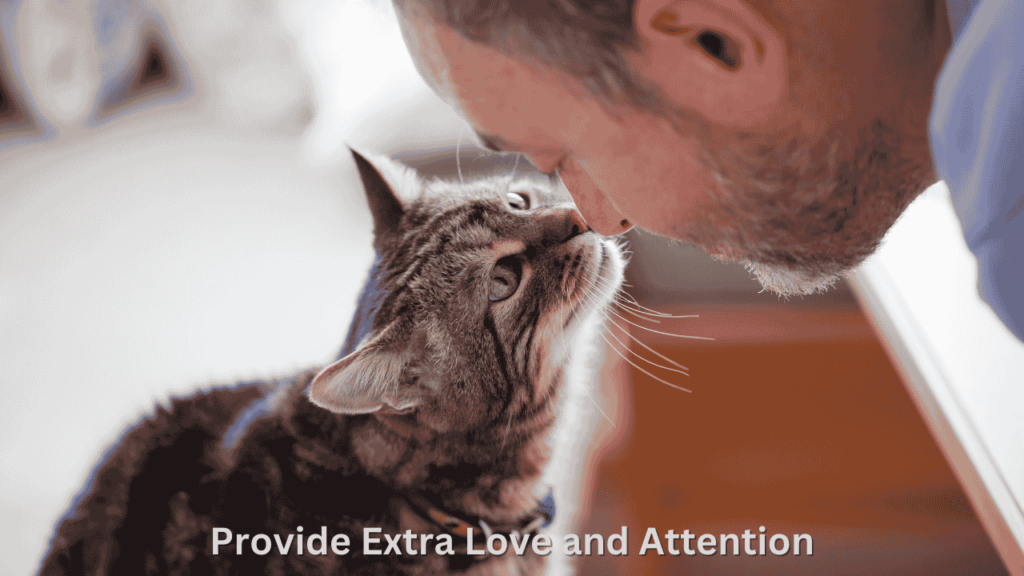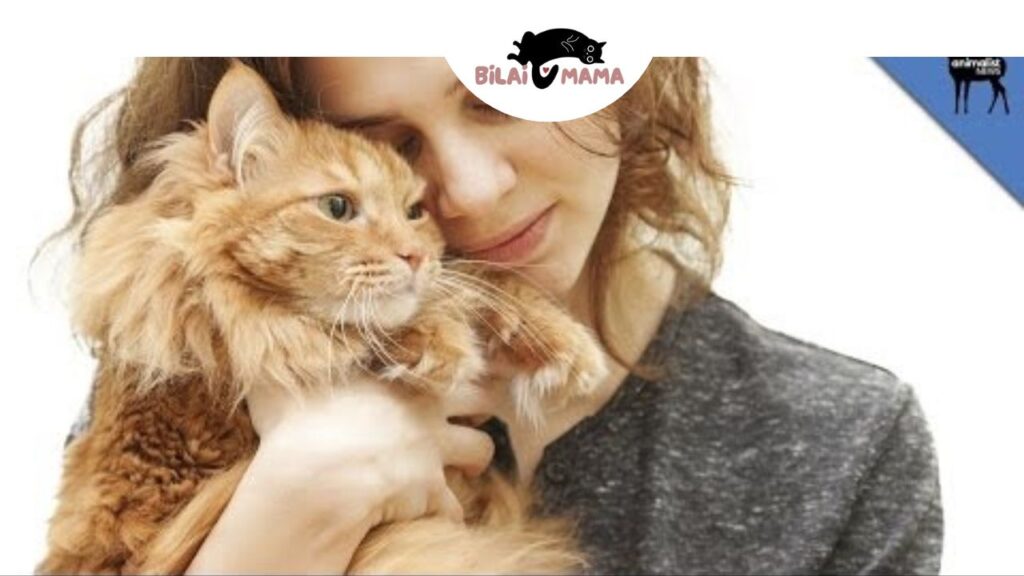As your cat ages, they may face challenges like arthritis, changes in vision, or even cognitive dysfunction syndrome (similar to dementia in humans). While these issues are tough on your cat, they can also lead to heightened stress levels. How to reduce stress in older cats is a topic that deserves attention, as chronic stress can exacerbate health problems, affect their behavior, and lower their quality of life.
Stress in older cats can manifest in many ways, from changes in eating habits to sudden aggression or withdrawal. But don’t worry—there’s a lot you can do to create a peaceful and comforting environment for your senior feline companion. By understanding the causes of stress and making a few adjustments, you can help your older cat feel safe, loved, and relaxed in their golden years.
Let’s explore how to reduce stress in older cats and make their lives better.
Understanding Stress in Older Cats
Before diving into the solutions, it’s important to understand what might be causing your senior cat stress in the first place. Cats, like humans, experience stress due to both physical and emotional factors, and for older cats, there are several common triggers.
Physical Factors: Aging and Health Issues
- Arthritis and Mobility Issues: As cats age, they often develop joint pain, which can make moving around difficult and uncomfortable. This pain can cause irritability and stress, especially when they have trouble reaching food bowls or litter boxes.
- Sensory Changes: Older cats may experience changes in their senses—diminished sight or hearing loss can be disorienting, leading to confusion and stress.
- Chronic Illness: Conditions like kidney disease, diabetes, or hyperthyroidism are common in older cats and can be stressful for them. They may feel unwell more often, which increases anxiety levels.
Emotional and Environmental Factors
- Changes in Routine: Cats are creatures of habit, and any disruption in their routine, such as moving to a new home, a new family member, or even a change in the food they eat, can cause stress.
- Lack of Stimulation: If your cat is no longer as active as they once were or isn’t getting enough mental stimulation, boredom can also lead to stress.
- Separation Anxiety: Older cats may become more attached to their owners and experience anxiety when left alone for long periods, especially if they are used to more interaction.

How to Reduce Stress in Older Cats: Practical Tips and Strategies
Now that you understand some of the reasons your senior cat may be stressed, let’s explore how you can help them feel calmer and more comfortable.
1. Provide a Calm, Safe Environment
The first step in reducing stress is creating a serene and secure environment for your senior cat. This is their space, so it should feel like a safe haven.
- Create Quiet Zones: Older cats often prefer a quiet, peaceful space where they can retreat to when they need rest. Create a designated area with soft bedding, away from noise and high activity.
- Predictable Routine: Cats thrive on routine. Keeping feeding times, playtime, and litter box cleaning predictable can help reduce anxiety.
- Cat Trees and Hiding Spots: Provide vertical spaces like cat trees, shelves, or hidey holes where your cat can go for privacy and a sense of security. Cats feel less stressed when they can retreat to high places, especially in the presence of potential threats (even if those “threats” are just a busy household!).
2. Reduce Pain and Discomfort
Physical pain, particularly from arthritis, can cause significant stress in older cats. While it may not always be possible to eliminate the pain completely, you can make your cat’s life more comfortable.
- Arthritis Relief: If your cat has arthritis, talk to your vet about pain management options. There are various treatments, including pain medications, joint supplements (like glucosamine and chondroitin), and even special orthopedic beds designed to reduce strain on the joints.
- Easier Access to Essentials: Make sure your cat’s food, water, and litter box are easy to reach. Elevated food and water bowls can make mealtime easier for cats with mobility issues, while a litter box with low sides can help your cat get in and out without difficulty.
3. Mental Stimulation and Enrichment
Just because your cat is getting older doesn’t mean they should be bored! Keeping your cat mentally stimulated can help reduce stress and prevent feelings of anxiety.
- Interactive Play: Engage your cat in daily play sessions to keep them mentally and physically active. Use toys that stimulate their instincts, like feather wands, laser pointers, or puzzle feeders.
- Comforting Sounds: Some senior cats may enjoy calming sounds like soft classical music or a white noise machine. These can provide a sense of security and drown out external noises that may cause stress.
- Feline Pheromone Diffusers: Synthetic pheromones, like Feliway, can help create a calming environment. These products mimic the natural pheromones cats produce, which help them feel safe and relaxed.
4. Monitor and Manage Health Issues
Stress often stems from underlying health conditions, and it’s essential to manage any medical issues your older cat might have.
- Regular Vet Visits: Keep up with regular vet checkups to monitor your cat’s health. Conditions like kidney disease, dental issues, and hyperthyroidism are common in older cats and can be managed with the right care.
- Medication Management: If your cat requires medication for chronic conditions, ensure they are receiving the appropriate dosage at the right times. Some cats may experience stress from medication changes or missed doses, so maintaining a schedule can help reduce this anxiety.
- Hydration: Cats with certain health conditions, like kidney disease, may become dehydrated. Dehydration can make them feel sluggish, which in turn adds to their stress. Make sure your cat always has access to fresh water, and consider offering wet food to increase their fluid intake.

5. Provide Extra Love and Attention
Sometimes, the most effective way to reduce stress is simply by offering your cat more love and companionship.
- Gentle Petting and Cuddles: Many older cats enjoy spending time with their human companions. Gentle petting, brushing, and snuggling can help them feel safe and loved. Just be sure to pay attention to your cat’s comfort levels—don’t force affection if they’re not in the mood.
- Bonding Time: Spend quality one-on-one time with your cat. Whether it’s simply sitting together in silence or watching TV, your presence can be a great source of comfort for them.
- Minimize Stressful Interactions: If there are other pets or people in the household who may be causing stress (such as overly energetic dogs or noisy children), try to give your cat a break from those interactions, especially if they’re feeling vulnerable in their senior years.
Frequently Asked Questions (FAQs)
1. My senior cat is suddenly hiding more—what should I do?
Hiding can be a sign that your cat is stressed or feeling unwell. Ensure your cat has a quiet, safe space where they can retreat. If the hiding persists, or if you notice other signs of illness, consult your vet to rule out health issues.
2. Can I give my senior cat calming treats or supplements?
Yes, there are calming treats and supplements available that contain ingredients like L-theanine, tryptophan, or Valerian root, which can help reduce stress. Always consult your vet before introducing any new supplement to ensure it’s safe for your cat.
3. How do I help my cat adjust to a new home or environment?
Give your senior cat plenty of time to adjust. Keep their routine as consistent as possible, and offer them quiet places to retreat. Gradually introduce new areas of the home and ensure their essentials (food, water, litter box) are easy to access.
Conclusion: The Gift of a Stress-Free Senior Life
Helping your senior cat reduce stress isn’t just about addressing their immediate anxiety—it’s about ensuring they live their golden years in comfort and peace. By understanding their needs, providing a calming environment, managing their health, and offering extra love, you’ll be setting them up for a happier and more relaxed life.
Your older cat deserves the best care possible, and by taking the time to reduce their stress, you’ll be rewarded with even more years of companionship and joy. Take it one step at a time, and remember: the bond you share with your feline friend is the greatest comfort they can have.

